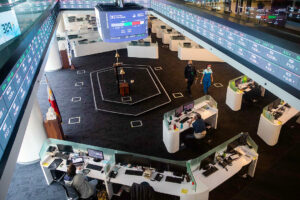By Revin Mikhael D. Ochave, Reporter
THE PHILIPPINE Stock Exchange index (PSEi) is projected to close the year at as high as more than 7,600 points, spurred by easing inflation and expected interest rate cuts.
The benchmark index could end the year at 6,998.71 to 7,665.26 points, with a 5% to 15% earnings growth for PSEi companies, Philstocks Research said in a report.
“For now, we see the possibility of the downside risks occurring to be low,” it said. “Hence, the market is expected to rally further towards the year’s end.”
The stock brokerage noted that with a robust labor market and easing inflation, it expects strong demand within the economy, which would trickle down to corporate revenues. “With easing inflation, we also expect the increase in production costs to be tempered. All of these would benefit our companies’ bottom line,” it added.
The PSEi finished 2023 at 6,450.04 points, 1.8% or 116.35 points lower than the previous year’s close.
On Wednesday, the index shed 0.01% or 0.8 point to close at 6,882.12 points. The broader all-share index dropped by 0.03% or 1.26 points to 3,729.52.
Inflation likely slowed to 3.7% in August, according to the median estimate of 15 analysts in a BusinessWorld poll. It hit a nine-month high of 4.4% in July. The local statistics agency will release August inflation data on Sept. 5.
Index members posted modest combined financial results, with revenue up by 8.43% year on year and net income rising by 4.96% amid the challenging macroeconomic backdrop in the first half, Philstocks said.
Alfred Benjamin R. Garcia, research head at AP Securities, Inc. expects the PSEi to hit 7,355 points by yearend, as the Philippine central bank continues its rate cut cycle in the fourth quarter.
“Our base case scenario of 50-basis-point (bp) rate cut this year still holds, as we’re still expecting the next rate cut to come in December,” he told BusinessWorld in a Viber message. “Earnings were also mostly in line with our expectations.”
“At this point, there’s minimal risk of inflation reigniting. I guess the only major risk is that consumer spending might not pick up as quickly as we hope,” he added.
Last month, the Monetary Board cut the benchmark interest rate by 25 bps to 6.25% after keeping it at a more than 17-year high in almost four years.
Bangko Sentral ng Pilipinas Governor Eli M. Remolona, Jr. earlier said they could deliver another 25-bp cut next quarter. The central bank’s last two policy meetings of the year will be on Oct. 17 and Dec. 19.
April Lynn C. Lee-Tan, chief equity strategist at COL Financial Group, Inc., said the PSEi could hit 7,100 by yearend.
“Risks would be weak economic and corporate earnings numbers, a recession in the United States and a weak stock market there,” she said in a Viber message.
ECONOMIC GROWTHCristina S. Ulang, research head at First Metro Investment Corp., kept the brokerage’s initial estimate of 7,000 to 7,500 points for the PSEi by yearend.
“The risks are a US recession and resurgent local inflation, while the catalysts for PSEi include easing food inflation, especially rice, and foreign buying on a sustained basis,” she told BusinessWorld in a Viber message.
Rice inflation slowed for the fourth straight month to 20.9% in July. Rice typically accounts for almost half of overall inflation.
Michael L. Ricafort, chief economist at Rizal Commercial Banking Corp., said the benchmark index could finish the year at 7,000 to 7,500, spurred by the country’s economic growth.
The Philippine economy expanded by 6.3% in the second quarter compared with the 5.8% growth a quarter earlier on higher state spending and investments.
“It is possible to sustain gross domestic product growth near or at 6% levels in the coming quarters due to favorable demographics and the continued recovery of some industries such as tourism and the possible increase in government spending to prepare for the May 2025 midterm elections,” he said in a Viber message.
Juan Paolo E. Colet, managing director at China Bank Capital Corp., sees a tamer increase for the index at 7,100 by the end of the year. “It could possibly be higher depending on incoming data,” he said in a Viber message.
At a news briefing last week, Unicapital Head of Research Wendy B. Estacio-Cruz lowered their estimate for the PSEi to 7,000 by end-2024 from 7,200.
“That’s a 9% gain from end-2023,” she said. “That’s based on our bottom-up analysis, which is based on an 11% earnings per share growth rate and at 12.5% target price-to-earnings,” she said.

